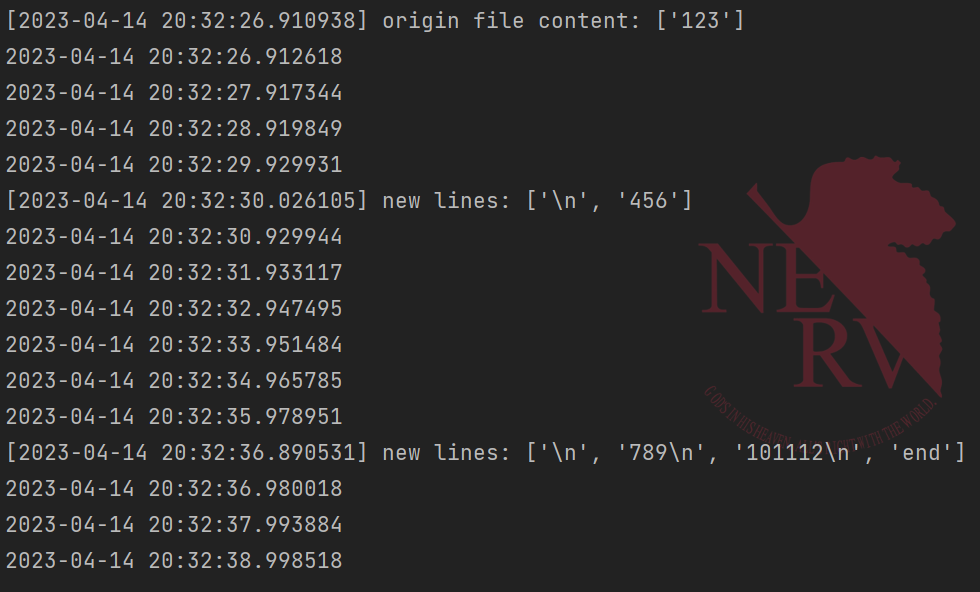本文最后更新于:2023-04-14T20:52:50+08:00
Watch Dog
在Python中,我们可以使用watchdog来实现文件监控。下面将介绍watch
dog的使用。首先可以使用pip进行安装。
watch
dog使用观察者模型,主要参与角色有observer,event_handler以及被监听的路径。当被监听的路径出现相关变化之后,就会触发event_handler中定义的方法。示例代码如下:
1 2 3 4 5 6 7 8 9 10 11 12 13 14 15 16 17 18 19 20 21 22 23 24 25 26 27 28 29 30 31 32 33 34 35 36 37 38 39 40 41 42 43 44 45 46 47 48 49 50 51 import datetimeimport timefrom watchdog.observers import Observerfrom watchdog.events import *class FileEventHandler (FileSystemEventHandler ):def __init__ (self ):def on_moved (self, event ):if event.is_directory:print ("directory moved from {0} to {1}" .format (event.src_path, event.dest_path))else :print ("file moved from {0} to {1}" .format (event.src_path, event.dest_path))def on_created (self, event ):if event.is_directory:print ("directory created:{0}" .format (event.src_path))else :print ("file created:{0}" .format (event.src_path))def on_deleted (self, event ):if event.is_directory:print ("directory deleted:{0}" .format (event.src_path))else :print ("file deleted:{0}" .format (event.src_path))def on_modified (self, event ):if event.is_directory:print ("directory modified:{0}" .format (event.src_path))else :print ("file modified:{0}" .format (event.src_path))if __name__ == '__main__' :"./" , False )try :while True :print (datetime.datetime.now())1 )except KeyboardInterrupt:
在watchdog中,observer实际上是一个守护线程,它并不会阻塞主线程的运行,所以我们这里在主线程中使用循环等待来查看相关效果。使用watchdog,我们主要完成的是继承FileSystemEventHandler类,然后覆盖相关方法,之后利用observer提供的schedule方法进行关联。需要注意的是,这里schedule有三个参数。第一个参数表示对应的事件Handler类;第二个参数表示需要监听的目录(而不是文件);第三个参数表示是否递归监听。如果仅需要监听某一个文件,则需要在相关触发方法中进行判断。
增量文件监听
利用watchdog的文件监听功能,我们可以实现一个增量文件的监听功能。在业务场景中,日志文件是非常常见的。日志文件实际上就是一个增量文件,我们可以监听日志文件内容的增加,然后获取到增加的内容,下面我们就实现这个功能。
首先直接展示完整代码如下:
1 2 3 4 5 6 7 8 9 10 11 12 13 14 15 16 17 18 19 20 21 22 23 24 25 26 27 28 29 30 31 32 33 34 35 36 37 38 39 40 41 42 43 44 45 46 47 48 49 50 51 52 53 54 55 56 57 58 59 60 61 62 63 64 65 66 67 68 import timeimport osimport datetimefrom watchdog.observers import Observerfrom watchdog.events import FileSystemEventHandlerclass FileUtil : @staticmethod def increment_read (begin_index: int , file: str ):open (file, 'r' , encoding='utf-8' )0 )return now_index, lines @staticmethod def raw_read (file: str ):open (file, 'r' , encoding='utf-8' )return linesclass FileEventHandler (FileSystemEventHandler ):def __init__ (self, file: str ):def on_modified (self, event ):if not event.is_directory and os.path.basename(self.file) == os.path.basename(event.src_path):print ("[{0}] new lines: {1}" .format (datetime.datetime.now(), new_lines))class IncrementSpy :def __init__ (self, directory: str , filename: str ):None print ("[{0}] origin file content: {1}" .format (datetime.datetime.now(), FileUtil.raw_read(self.file)))def execute (self ):False )def close (self ):if self.observer is not None :if __name__ == '__main__' :'./' , 'test.txt' )try :while True :print (datetime.datetime.now())1 )except KeyboardInterrupt:
我们可以准备一个test.txt文件,其中可以填一些初始内容。之后启动程序,同时使用编辑器对test.txt文件进行编辑,当我们完成编辑保存之后,在运行界面中就会出现相关的提示。同时我们在主线程中循环打印时间,目的是为了表现监听线程并不会阻塞主线程的执行。运行效果如下:
注意只能监听增量文件,并不能监听文件内容的修改(指delete/update)
接下来就开始介绍相关功能的实现。
首先我们实现了一个工具类FileUtil,其中提供两个静态方法,分别是用于读取文件的全部内容raw_read以及从指定index开始读取文件内容的increment_read,第二个增量读取的方法在读取内容的同时还会返回当前文件的index,方便下一次的增量读取。
之后我们实现watchdog中相关的处理类,即FileEventHandler。它继承FileSystemEventHandler,但是我们只实现了其中的on_modified方法,用于监听文件修改事件。由于我们这里只需要监听对应的文件,所以我们需要在这个方法中进行判断,只有event对应的src_path符合我们的要求时才进行动作。触发的动作就是进行增量读取,同时保存当前的index。
最后,我们将整个监听操作进行包装,实现IncrementSpy类。在构造方法中,它会首先读取文件的初始内容并进行输出,之后执行execute方法进行监听。在execute方法中,我们完成的主要是Observer对象的创建以及schedule的指定。对于使用者来说,只需要在初始化IncrementSpy类之后调用execute方法即可,就如同在main中的使用方法一样。
参考文章
python watchdog
详细讲解-云社区-华为云 (huaweicloud.com) python中文件变化监控-watchd
- 腾讯云开发者社区-腾讯云 (tencent.com) python
实现增量的读取文件 - 简书 (jianshu.com)
